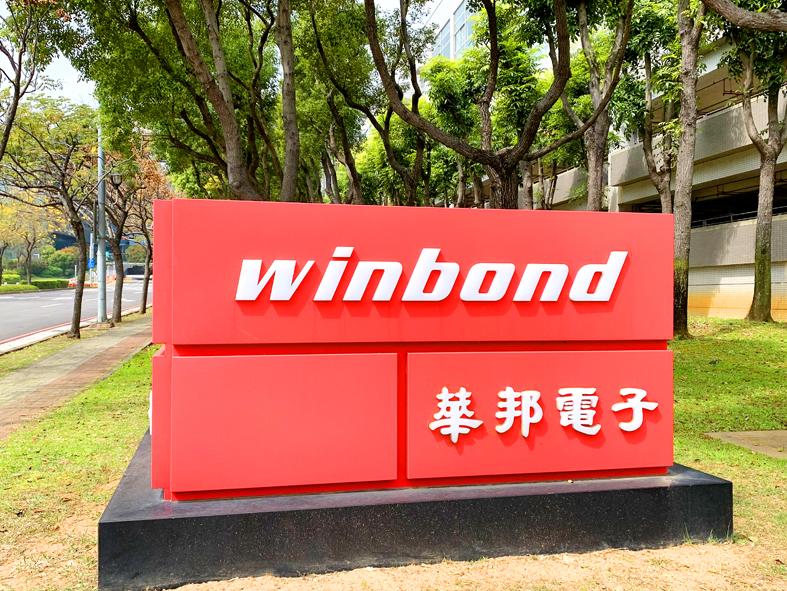Memorychip maker Winbond Electronics Corp (華邦電子) yesterday said it is expanding DDR3 DRAM capacity to satisfy demand, which would help boost the revenue contribution from the segment to 50 percent of overall DRAM revenue in 2024.
DDR3 DRAM sales make up 30 percent of Winbond’s total DRAM revenue, the company said in a statement.
Winbond said DRAM sales made up more than 20 percent of its revenue of NT$20.77 billion (US$710.1 million) in the second half of last year.

Photo: Grace Hung, Taipei Times
Winbond has been in the DDR3 DRAM business for 10 years and aims to ensure a stable supply to its customers amid a supply crunch.
South Korea’s Samsung Electronics Co and SK Hynix Inc are exiting the sector, while new supply from Taiwan and China cannot catch up with demand in the short term.
Prices of DDR3 DRAM chips are to be flat or rise about 5 percent this quarter, market researcher TrendForce Corp (集邦科技) said.
A new fab in Kaohsiung is expected to produce 10,000 12-inch wafers a month in the fourth quarter of this year, Winbond said.
To cope with demand, Winbond plans to start a second-phase capacity expansion by adding 10,000 wafers a month at the fab, it said.
In February, the company’s board of directors approved an additional investment of NT$28.99 billion to fund the capacity expansion.
This year, Winbond has budgeted NT$45.8 billion for capital expenditure, surging from NT$9.4 billion last year.

TECH CLUSTER: The US company’s new office is in the Shalun Smart Green Energy Science City, a new AI industry base and cybersecurity hub in southern Taiwan US chip designer Advanced Micro Devices Inc (AMD) yesterday launched an office in Tainan’s Gueiren District (歸仁), marking a significant milestone in the development of southern Taiwan’s artificial intelligence (AI) industry, the Tainan City Government said in a statement. AMD Taiwan general manager Vincent Chern (陳民皓) presided over the opening ceremony for the company’s new office at the Shalun Smart Green Energy Science City (沙崙智慧綠能科學城), a new AI industry base and cybersecurity hub in southern Taiwan. Facilities in the new office include an information processing center, and a research and development (R&D) center, the Tainan Economic Development Bureau said. The Ministry

ADVERSARIES: The new list includes 11 entities in China and one in Taiwan, which is a local branch of Chinese cloud computing firm Inspur Group The US added dozens of entities to a trade blacklist on Tuesday, the US Department of Commerce said, in part to disrupt Beijing’s artificial intelligence (AI) and advanced computing capabilities. The action affects 80 entities from countries including China, the United Arab Emirates and Iran, with the commerce department citing their “activities contrary to US national security and foreign policy.” Those added to the “entity list” are restricted from obtaining US items and technologies without government authorization. “We will not allow adversaries to exploit American technology to bolster their own militaries and threaten American lives,” US Secretary of Commerce Howard Lutnick said. The entities

Minister of Finance Chuang Tsui-yun (莊翠雲) yesterday told lawmakers that she “would not speculate,” but a “response plan” has been prepared in case Taiwan is targeted by US President Donald Trump’s reciprocal tariffs, which are to be announced on Wednesday next week. The Trump administration, including US Secretary of the Treasury Scott Bessent, has said that much of the proposed reciprocal tariffs would focus on the 15 countries that have the highest trade surpluses with the US. Bessent has referred to those countries as the “dirty 15,” but has not named them. Last year, Taiwan’s US$73.9 billion trade surplus with the US

The Taipei International Cycle Show (Taipei Cycle) yesterday opened at the Taipei Nangang Exhibition Center, with the event’s organizer expecting a steady recovery in the industry this year following a tough last year. This year, 980 companies from 35 countries are participating in the annual bicycle trade show, showcasing technological breakthroughs and market development trends of the bicycle industry at 3,600 booths, the Taiwan External Trade Development Council (TAITRA, 外貿協會) said in a statement. Under the theme “Ride the Revolution,” the exhibition has attracted more than 3,500 international buyers from 80 countries to preregister for the four-day event, which is expected to